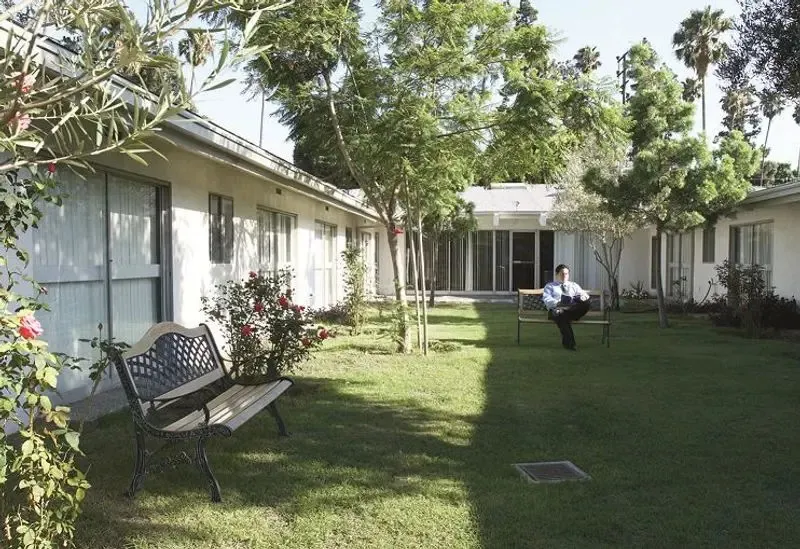Explore leading methamphetamine rehab centers and treatment facilities in Los Angeles and nearby areas. Methamphetamine addiction treatment centers offer specialized programs combining medically supervised detox, behavioral therapies, and skills training to support lasting recovery. Through targeted therapy, relapse prevention, and holistic care—including nutrition and exercise—these facilities help individuals address both the immediate and long-term effects of meth use. Find the best methamphetamine treatment centers dedicated to helping individuals regain control, achieve stability, and rebuild healthier, substance-free lives.
Ads
More Info
Advertisement Disclosure
Our website is funded by advertisers who pay for prominently labeled placements.
Read More177 Rehab Centers were found
Filters
Locations
- Los Angeles(+98)
- Culver City(+14)
- Westlake Village(+13)
- Woodland Hills(+11)
- Beverly Hills(+10)
- Santa Monica(+9)
- Sherman Oaks(+7)
- West Hollywood(+6)
- Malibu(+5)
- Chatsworth(+5)
- Pasadena(+5)
- Encino(+5)
- Redondo Beach(+4)
- Lancaster(+4)
- Reseda(+4)
- Studio City(+4)
- Northridge(+3)
- San Mateo(+3)
- Lynwood(+3)
- Vernon(+3)
- Van Nuys(+3)
- Tarzana(+3)
- North Hollywood(+3)
- Glendale(+3)
- Gardena(+3)
- Riverside(+3)
- Granada Hills(+2)
- Shadow Hills(+2)
- Venice(+2)
- Orange County(+2)
- Pomona(+2)
- West Hills(+2)
- Valley Village(+2)
- Burbank(+2)
- Brentwood(+2)
- Long Beach(+2)
- Sun Valley(+1)
- Torrance(+1)
- San Jacinto(+1)
- San Pedro(+1)
- Upland(+1)
- Whittier(+1)
- Toluca Lake(+1)
- Thousand Oaks(+1)
- Simi Valley(+1)
- Mission Viejo(+1)
- Acton(+1)
- Beaumont(+1)
- Wilmington(+1)
- Panorama City(+1)
- Anaheim(+1)
- Laguna Hills(+1)
- Inglewood(+1)
- Alhambra(+1)
- Rosemead(+1)
- Maywood(+1)
- Manhattan Beach(+1)
- Monterey Park(+1)
- Claremont(+1)
- Covina(+1)
- La Puente(+1)
- Pico Rivera(+1)
- San Fernando(+1)
- Azusa(+1)
- Santa Fe Springs(+1)
- Glendora(+1)
- Agoura Hills(+1)
- El Segundo(+1)
- Duarte(+0)
- Sunland(+0)
- Downey(+0)
- Cudahy(+0)
- El Monte(+0)
- Compton(+0)
- Hermosa Beach(+0)
- Cerritos(+0)
- Calabasas(+0)
- Bellflower(+0)
- Bell Gardens(+0)
- Avalon(+0)
- Arcadia(+0)
- Altadena(+0)
- Paramount(+0)
- South El Monte(+0)
- Walnut(+0)
- West Covina(+0)
- Santa Clarita(+0)
- San Gabriel(+0)
- San Dimas(+0)
- Rolling Hills(+0)
- Orange(+0)
- Hawaiian Gardens(+0)
- Palmdale(+0)
- Norwalk(+0)
- Montebello(+0)
- Lakewood(+0)
- South Pasadena(+0)
- Carson(+0)
- Hawthorne(+0)
Conditions
- Drug(+278)
- Alcohol(+219)
- Mental Health(+195)
- Opioid(+193)
- Cocaine(+184)
- Trauma(+180)
- Methamphetamine(+177)
- Benzodiazepines(+174)
- Heroin(+173)
- Prescription Drugs(+159)
- Depression(+152)
- Anxiety(+149)
- Xanax(+145)
- Synthetic Drugs(+138)
- PTSD(+133)
- Adderall(+131)
- Marijuana(+112)
- Bipolar(+109)
- Ecstasy(+104)
- MDMA(+99)
- Behavioral Health(+93)
- LSD(+93)
- Psychedelics(+91)
- Fentanyl(+71)
- Stress(+71)
- OCD(+69)
- Personality Disorders(+63)
- ADHD(+61)
- Gambling(+38)
- Eating Disorders(+35)
- Anorexia(+34)
- Binge Eating Disorder(+34)
- Bulimia(+33)
- Schizophrenia(+32)
- Gaming(+28)
- Internet Addiction(+27)
- Sex Addiction(+25)
- Burnout(+23)
- Pornography(+22)
- Shopping(+10)
- Narcissism(+8)
Insurances
- BlueCross BlueShield(+129)
- Aetna(+126)
- Anthem(+105)
- Cigna(+105)
- United Healthcare(+66)
- Humana(+63)
- Optum(+53)
- Medicaid(+53)
- MHN(+51)
- Magellan Health(+47)
- Kaiser Permanente(+39)
- Medicare(+31)
- GEHA(+31)
- ComPsych(+29)
- Highmark(+25)
- AmeriHealth(+13)
- Tufts Health(+11)
- Oscar(+9)
- CareFirst(+9)
- Molina Healthcare(+8)
- Intermountain Healthcare(+6)
- Beacon Health Options(+2)
- UMR(+2)
- NYSHIP(+2)
- ILWU(+2)
- Geisinger(+2)
- Empire Life(+2)
- Empire BCBS(+2)
- Bright Health(+2)
- GuideWell(+1)
Therapies

$30,000-$50,000

$45,000+ - 30-90 days

Call for Rates - 30+ days

Call for rates - 7-30 days

$1,000/day - 30+ days

$1,500 - $3,000/Month - 3-6 Months
Explore Methamphetamine Rehab and Recovery Options in Los Angeles
Methamphetamine, commonly known as meth, crystal meth, or ice, is one of the most dangerous and highly addictive stimulant drugs. Long-term meth use can cause severe psychological and physical damage, making professional rehabilitation essential for recovery. Los Angeles is home to specialized meth rehab centers that provide medical detox, behavioral therapy, and long-term recovery strategies to help individuals break free from addiction. For those seeking help with other types of substance use or co-occurring mental health conditions, you can explore a full range of addiction and mental health conditions and find centers that offer various levels of care based on individual needs.
Understanding Methamphetamine and Its Addictive Nature
Methamphetamine is a synthetic stimulant that drastically increases dopamine levels in the brain, leading to intense euphoria, increased energy, and heightened focus. However, its effects come at a high cost. Meth is highly neurotoxic, meaning it damages brain cells and alters brain chemistry. With prolonged use, individuals experience severe cognitive decline, paranoia, aggression, and psychotic symptoms. Similar patterns of risk are seen with other stimulants, such as cocaine addiction, and mixing these substances can increase harm.
Street Names and Forms of Methamphetamine
Methamphetamine is sold and consumed in different forms, each with its own street names and methods of use. Common types include:
- Crystal Meth – A highly potent, crystalline form that is usually smoked, also called “Ice” or “Glass.”
- Powdered Meth – A white or off-white powder that can be snorted, injected, or swallowed, often referred to as “Speed.”
- Meth Pills – Sometimes mixed with other stimulants or opioids and sold as party drugs, often under street names like “Yaba.”
Regardless of the form, meth is highly addictive, and even short-term use can lead to dependency and dangerous side effects. If you’re struggling with other substances such as prescription drugs or marijuana, specialized programs are also available.
Short-Term and Long-Term Effects of Meth Use
Short-Term Effects:
Methamphetamine provides an immediate rush of euphoria and energy, but it also triggers:
- Increased heart rate and blood pressure
- Decreased appetite and rapid weight loss
- Hyperactivity and talkativeness
- Insomnia and prolonged wakefulness
- Extreme focus or repetitive behaviors
Long-Term Effects:
Chronic meth use results in devastating physical and psychological effects, including:
- Severe dental decay (“meth mouth”) due to dry mouth and teeth grinding
- Skin sores and infections from excessive picking due to hallucinations (“meth mites”)
- Memory loss and cognitive impairment due to brain damage
- Psychotic symptoms such as paranoia, hallucinations, and violent behavior
- Severe weight loss and malnutrition
Many individuals suffering from meth addiction experience methamphetamine-induced psychosis, a condition where hallucinations and delusions persist even after stopping drug use.
Symptoms of Methamphetamine Withdrawal
Stopping meth use can result in intense withdrawal symptoms, making professional detox and rehabilitation essential. Meth withdrawal is primarily psychological, with symptoms including:
- Extreme fatigue and excessive sleepiness
- Intense drug cravings
- Severe depression and suicidal thoughts
- Anxiety and irritability
- Lack of motivation or emotional numbness
- Increased appetite and weight gain
Because withdrawal symptoms can be overwhelming, many people relapse without professional support. Meth rehab centers in Los Angeles offer medical and psychological care to help individuals safely detox and begin recovery. Those experiencing challenges with benzodiazepines may need a benzodiazepine addiction program with its own specialized approach.
Detox and Treatment for Methamphetamine Addiction
Medically Supervised Detox
Since meth withdrawal does not involve severe physical symptoms like opioid withdrawal, medical detox focuses on stabilizing mood and mental health. Doctors may prescribe medications to manage depression, anxiety, and insomnia during the detox phase. For those seeking guidance on therapies, see the options under addiction therapy modalities for comprehensive care approaches.
Inpatient Meth Rehab
Methamphetamine is known for its high relapse rate, making inpatient treatment the best option for many individuals. Residential rehab provides a controlled environment free from triggers, allowing individuals to focus entirely on recovery. Treatment includes:
- Cognitive Behavioral Therapy (CBT) to address destructive thought patterns and behaviors
- Medication support to help with mood stabilization and cravings
- Nutritional therapy to restore health after meth-related malnutrition
- Physical activity and movement therapy to help rebuild strength and stamina
Outpatient Treatment for Methamphetamine Addiction
For those unable to commit to inpatient rehab, outpatient meth rehab provides flexible treatment options while allowing individuals to continue working or managing family responsibilities. Intensive outpatient programs (IOP) and partial hospitalization programs (PHP) offer structured support through therapy, counseling, and group recovery meetings.
Meth and Polydrug Abuse
Many individuals addicted to meth also use other substances, such as:
- Meth and alcohol – Some users drink to balance out meth’s stimulant effects, increasing the risk of alcohol poisoning.
- Meth and opioids (speedballing) – A dangerous combination that can lead to respiratory failure. For those with overlapping opioid concerns, see options for opioid addiction treatment in Los Angeles.
- Meth and benzodiazepines – Often used to counteract meth’s stimulant effects, increasing the likelihood of overdose.
Los Angeles rehab centers offer dual diagnosis treatment for individuals struggling with both meth addiction and other substance use disorders, including other drug addictions and mental health concerns.
The Role of Therapy in Meth Recovery
Since methamphetamine addiction primarily affects the brain’s reward system, therapy is crucial in rewiring thought patterns and behaviors. Effective therapy methods include:
- Behavioral therapy to help individuals regain control over impulsive behaviors
- Motivational Incentive Therapy (also known as contingency management) to reward positive progress
- Group therapy and 12-step programs for peer support and accountability
- Holistic therapies such as meditation, yoga, and creative arts to aid in emotional healing
Those with a history of trauma may also benefit from trauma-focused therapy programs that address underlying emotional wounds.
Life After Meth Rehab
Recovery from meth addiction is a long-term commitment, as cravings and psychological struggles may persist for months or even years. Aftercare programs play a vital role in helping individuals maintain sobriety, including:
- Sober living homes to provide a structured environment post-rehab
- Ongoing therapy and support groups for continued accountability
- Career and education support to rebuild life after addiction
Many rehab centers in Los Angeles offer relapse prevention planning, teaching individuals how to navigate triggers and stressors without turning to meth use. For those battling multiple substance addictions, you may want to explore more on benzodiazepine addiction and related treatment pathways.
Finding the Right Meth Rehab in Los Angeles
Choosing the right rehab center depends on several factors, including treatment approach, facility accreditation, and available support services. Since meth addiction can be particularly challenging to overcome, selecting a rehab with experience in stimulant addiction treatment is crucial. Speaking with an addiction specialist can help determine the best path to recovery and connect you with the most suitable addiction treatment programs in Los Angeles.
Frequently Asked Questions
How long does meth rehab take?
Is meth withdrawal dangerous?
Can I recover from meth addiction without rehab?
Does insurance cover meth rehab in Los Angeles?
Ads
More Info
Advertisement Disclosure
Our website is funded by advertisers who pay for prominently labeled placements.
Read More






































